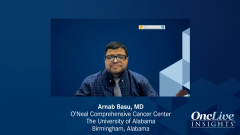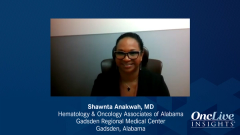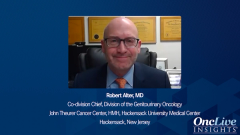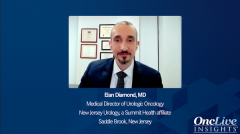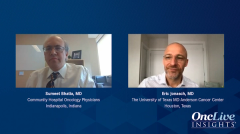
Advanced Renal Cell Carcinoma: Clinical Practice Pearls
Drs Sumeet Bhatia and Eric Jonasch highlight unmet needs in advanced renal cell carcinoma and share clinical pearls.
Episodes in this series

Sumeet Bhatia, MD: Can I ask you to offer some clinical practice pearls to the community on how to care for these patients?
Eric Jonasch, MD: I think the main thing is patient empowerment. That sounds fluffy, but I think the main thing is that the toxicities we see with these targeted therapies really are telling us about the interaction between these agents and the biology of the individual, and the pharmacodynamics of that particular agent. I have found that I’ve never really lost response in individuals where we’ve started to change the schedule and the dose of the TKIs [tyrosine kinase inhibitors] to accommodate their toxicities. We have a lot of people who are on TKIs where they have some interrupted schedule, where the FDA label says take it continuously, but we have people who take it for 12 days and then take a 2-day break, or adjust to their toxicities. We find that by doing this, we keep the toxicity level below a threshold at which the patient can tolerate, and we’re not really harming efficacy.
There are multiple studies we’ve done where we’ve shown that if people are developing adverse effects, they’re probably at that point where they’re actually deriving benefit. We just have to make sure that we let the patient guide us in how to manage their toxicity. That’s what I’ve learned by using these agents over the years. I guess the other thing is, never give up. A person who has been on first line, second line, third line, and then you’re like, “They’re not going to respond to lenvatinib-everolimus in the fourth-line setting.” Guess what? They might, and as long as you manage the toxicity, it’s probably worth trying. I have several grateful patients who’ve been alive multiple years longer because we stumbled upon that regimen.
Sumeet Bhatia, MD: Have you used the old warhorse sunitinib recently, and in what setting?
Eric Jonasch, MD: Yes, I did actually. I just started an individual where we were very concerned about social management of IO [immuno-oncology]/TKI toxicities or IO/IO toxicities. The patient had a favorable risk. We know that the OS [overall survival] data with favorable-risk patients with sunitinib vs whether it is ipi-nivo [ipilimumab-nivolumab], cabo-nivo [cabozantinib-nivolumab], pembrolizumab- axitinib, or lenvatinib-pembrolizumab, there is not an OS advantage for any of these regimens. Subset analyses, but there is a subset of patients, favorable risk, low disease burden, where you may want to start them with a TKI.
Thank you, Dr Bhatia, for this rich and informative discussion. I’ve learned a lot from you, but before we conclude, I’d like to get a couple of final thoughts on unmet needs and future perspectives from you, from a community practice perspective.
Sumeet Bhatia, MD: One [unmet need] would be better guidance on how to choose an appropriate TKI inhibitor as we use IO therapy. I think there is a great need for more education on the use of nivolumab-ipilimumab, especially because I’ve seen patients with good-risk metastatic RCC [renal cell carcinoma] who have been treated with that regimen, which I think is inappropriate. I’d like to see more access to clinical trials, especially in the second-line situation. I look forward to data on the use of anti-HIF [hypoxia-inducible factor]–1 and 2 alpha drugs and how to incorporate them into our practice.
Eric Jonasch, MD: Great. I think all very good points and all very important. Thank you again, Dr Bhatia, for this insightful discussion. And to our viewer audience, thank you for joining us. We hope you found this OncLive® My Treatment Approach program to be useful and valuable for your patients with renal cell carcinoma.
Transcript edited for clarity.


